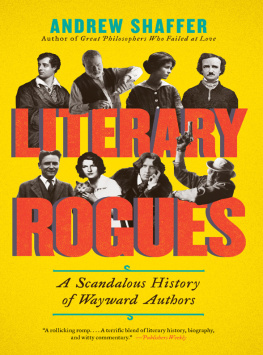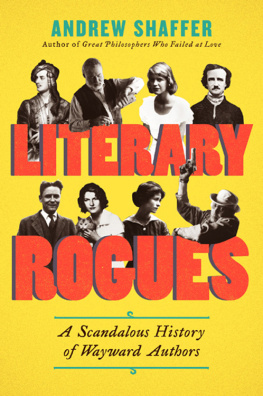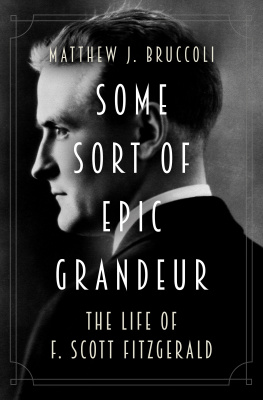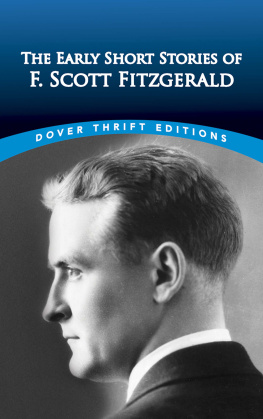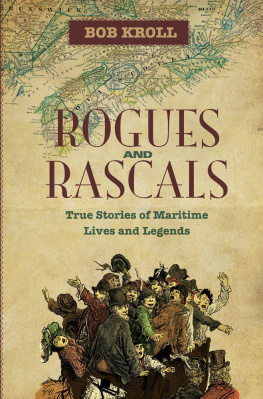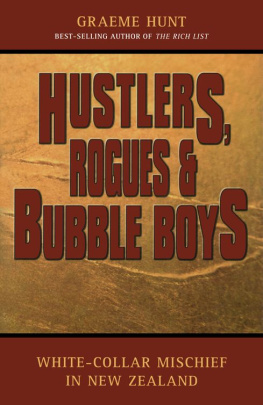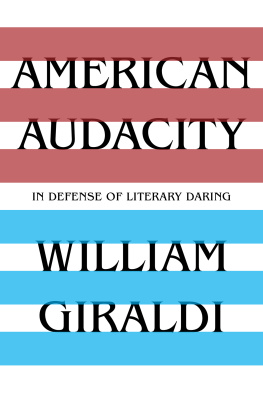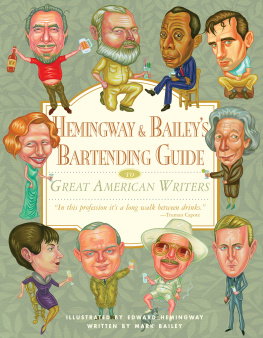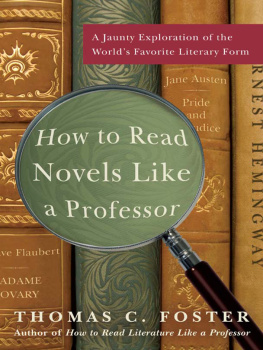
For Tiffany, my favorite vice
CONTENTS


The writers featured in Literary Rogues are professionals. Do not attempt to indulge in any of the vices on display within these pages without first consulting either a physician or a lawyer. Probably both, just to be safe.

Ignore the authors disclaimer. Ive tried out every vice in this book and seem to have turned out all right. Im not broke, strung out on drugs, and living under a bridge. As of this writing. Subject to change.

There was a time when courtesy and winning ways went out of style, when it was good to be bad, when you cultivated decadence like a taste. We were all dangerous characters then.... [We] struck elaborate poses to show that we didnt give a shit about anything.
T. C. BOYLE, GREASY LAKE

, I wanted to be a writer because writers were rich and famous. These are the words of William S. Burroughs, but they could have been spoken by countless other authors over the years. In fact, I suffered from the same delusion when I was twelveuntil one Sunday afternoon when my parents dropped me off at a sketchy, two-star hotel.
Comic Convention. Today. $1. Grand Ballroom, read the sign in the lobby. Once I found the ballroom, I handed a crumpled dollar bill to the woman working the door. My hand trembled with excitement. I was moments away from breathing the same air as Marvel Comics writer , the advertised guest of honor. As I stepped through the ballroom door, I tried to imagine what would happen once I was face-to-face with the author of such superheroes as the ass-kicking, cigar-chomping Wolverine. The possibilities were limitless, but they all ended with Castle offering me a job writing The X-Men.
After my eyes adjusted to the dim lighting, I surveyed the room. It was an endless sea of comic books, piled on tables and packed in boxes underneath. To my immediate left, I found what I was looking for atop a card table: a folded sheet of paper with the guest of honors name. A squat, potbellied man in a faded Batman T-shirt sat slumped behind the table, nursing a one-liter bottle of Mountain Dew. This obviously had to be the writers bodyguard.
Excuse me, when will Mr. Castle be here? I asked him.
The man chuckled. Hes here right now, he said. After an awkward pause in which it became clear I didnt understand, he added, Im Frank Castle.
Oh. I made no effort to disguise my disappointment. While I wasnt expecting Castle to be injecting heroin into his eyeballs while getting blown by groupies, I was wholly unprepared to discover that the man behind the curtain was so ... ordinary. Were all authors such unremarkable creatures?
Backing away from the table, I quickly made up my mind to pick a different career.
I stumbled across Less Than Zero in a used paperback bookstore when I was fifteen. (For those of you who dont know what bookstores are, ask your parents.) I tore through it in one evening, and then started rereading it. Less Than Zero was the literary equivalent of a Guns N Roses albumall sex, drugs, and bad attitude. And from what I subsequently read in magazines, its author, Bret Easton Ellis, lived by the adage Write what you know. Ellis was, in a word, cool.
Before long, I was drinking, smoking, and having sex (or at least trying to). My grades were slipping, toonot just because I was stoned most of the time, but also because I was spending more time reading books I wanted to read than the ones being assigned in class. Jack Kerouac was cool; Charles Dickens wasnt. Hunter S. Thompson was cool; Jane Austen wasnt. Cool writers were easy to spot: all you had to do was look for the cigarettes dangling precariously from their lips and the whiskey bottles next to their typewriters.
It wasnt until I went to college that I realized how outdated the tortured-artist caricature in my head was. Kerouac was considered something of a joke by my professors and classmates; Ellis was regarded as a prima donna who valued shock over craft. Passing out drunk while filling the bathtub and accidentally flooding your hotel room like F. Scott Fitzgerald wasnt coolit was pathetic and sad. Drinking wine out of a human skull like Lord Byron? That was something only halfwits like Beavis and Butt-Head would find amusing.
Nowadays, unrepentant boozers in the tradition of Ernest Hemingway and Dorothy Parker are conspicuously absent from bestseller lists, where the courteous and sober rule the day. James Frey tells me. Now theyre just sort of wimps.
Well, fuck. Whatever happened to the literary bad boys and girls of yesteryear?
In Literary Rogues, I turn back the clock to visit the writers who were as likely to appear in gossip rags as they were to be on bestseller lists. They wrote generation-defining classics such as The Great Gatsby and On the Road, earning them coveted spots in the literary hall of fame. They also lived like rock stars ages before Keith Richards smoked his first cigarette. From shooting smack to shooting other people, wayward authors have done it alland lived long enough to write about it, in most cases. Their antics are sometimes amusing, sometimes appalling. But, like their work, always fascinating and impossible to look away from.
Pour yourself a drink. The party is about to begin...
Andrew Shaffer
Lexington, Kentucky
August 2012

, we must first acquaint ourselves with vice.
THE MARQUIS DE SADE
B y the time the Marquis de Sade (17401814) was born in Paris, exactly three hundred years had passed since Johannes Gutenberg revolutionized the world by designing the first European printing press using movable type. Prior to Gutenbergs invention, books had been painstakingly copied by handa copy of the Holy Bible, for instance, could take a monastery scribe a year or more to produceand thus books were primarily of a religious and educational nature, intended for the clergy and the upper classes. Adoption of Gutenbergs printing methods was swift, expanding readership to all walks of life. While nearly 200 million copies of books were printed by the end of the sixteenth century, government regulation and church censorship continued to restrict the diversity of the marketplace; early bestseller lists were dominated by the Holy Bible and religious books by authors such as the Catholic priest Erasmus.
Fighting the free flow of information was an exhausting battle, however, and officials eventually began to ease restrictions. During the eighteenth century, the variety of reading material available exploded, and new forms such as novels and journalism emerged. The real promise of the Gutenberg revolution was finally coming to fruition. Nothing, however, could have prepared readers for what the Marquis de Sade was about to unleash upon them. As French philosopher Albert Camus wrote, really begin with him.
Next page
